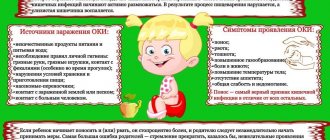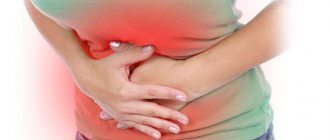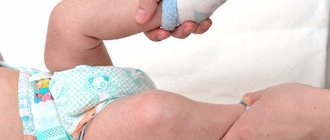The well-being of their own child is more important for parents than anything else. When a son or daughter gets sick and loses interest in life, the mother’s heart breaks. Children are exposed to viruses and bacteria that cause symptoms of diseases of various etiologies. Often, concerns about the baby's health can cause abdominal pain, nausea, and vomiting. The symptoms are interrelated and are inherent in diseases of the gastrointestinal tract, toxic infections, and sunstroke. It is important to monitor the occurrence of changes in the offspring’s usual behavior. If pain or vomiting occurs, take your temperature, call the clinic, or an ambulance (depending on the severity of the symptoms).
Causes of vomiting and abdominal pain in a child
When a baby has a stomach ache, nausea, vomiting, there is an infection or food toxin in the body. Factors in the development of common signs of diseases are:
- Acute respiratory viral infection (including intestinal flu);
- Acute intestinal infection;
- Gastritis;
- Cholecystitis;
- Inflammation of the appendix;
- Ulcer in the stomach;
- Intestinal obstruction.
An experienced medical professional will help you understand what causes discomfort to the child, provokes vomiting, or stomach cramps. It is impossible to delay diagnosis and treatment.
ARVI
A respiratory viral infection enters the body orally (through kissing), through airborne droplets, or after touching contaminated objects with subsequent transfer of the virus to the mucous membrane. The susceptibility of children to ARVI is higher than that of adults due to reduced immunity. The disease begins in an acute form with an intense runny nose and cough. Rising temperature and headache aggravate the condition. The baby complains that his stomach hurts and he feels nauseous. Single vomiting is provoked by fever.
The pediatrician will prescribe an antipyretic, immunomodulator, and antiviral agent. The cause of the gag reflex is neutralized by antiemetic drugs. For respiratory infections, drinking plenty of fluids, limiting food and complete rest is recommended.
Rotavirus infection
Intestinal flu is common in children. The causative agents of rotavirus infection are brought by a daughter or son from a kindergarten, school, or section. The younger the patient is, the more severe the symptoms of the disease are tolerable. Pathogenic microorganisms immediately affect the intestinal mucosa. The amount of pathogen and the state of immunity affects the rate of development of the disease in the child.
It begins like a typical flu - runny nose, sore throat, cough. Signs of a cold disappear, and dyspepsia (bloating) occurs. This distinguishes intestinal flu from gastrointestinal diseases that are periodically accompanied by diarrhea. Specific factors of infection:
- Throat hyperemia;
- Mild rhinitis, cough;
- Stomach growls and hurts;
- Diarrhea with copious discharge of masses of clay-like consistency with a pungent odor up to ten times a day;
- Nausea, repeated vomiting;
- Low-grade or elevated temperature;
- Decreased mood, weakness.
Younger age and a weakened immune system delay recovery. In severe cases, babies develop renal failure, dehydration, and hemodynamic changes. A parent can avoid negative consequences after suffering a pathology by strictly following the doctor’s recommendations. Manifestations of the disease are similar to salmonellosis, dysentery, and food poisoning. To exclude serious illnesses, the doctor prescribes additional tests. Timely treatment will help avoid complications.
Acute intestinal infection
This disease is interpreted as food poisoning or foodborne illness. Food contaminated with pathogenic microflora disrupts the functionality of digestion and provokes the development of the following symptoms:
- Nausea, vomiting;
- Increased body temperature;
- Diarrhea;
- Abdominal colic;
- Loss of moisture from the body, leading to dry skin.
Course of the disease
The passage of vomit brings short-term relief to the little person. Diarrhea is accompanied by repeated urges. Frequent bowel movements aggravate severe pain in the abdominal cavity. Losing a significant amount of fluid dehydrates the body. The temperature rises, the baby becomes lethargic and apathetic. Lost appetite.
Rinsing will help in case of poisoning if toxins enter the stomach. A salt solution (a tablespoon per liter of boiled water at room temperature) will help with washing the stomach of older children. Mild poisoning resolves by inducing vomiting by applying pressure to the root of the tongue.
A rehydron solution taken in small sips will help save a child from dehydration. Absorbing drugs are taken after vomiting to quickly remove toxins from the body. The doctor prescribes intestinal bactericides and probiotic preparations.
Consequences
Vomiting and abdominal pain can lead to dangerous consequences.
Rotavirus infection is dangerous due to the rapid development of dehydration.
Without treatment, dehydration is the cause of death in infants. If you notice a dry tongue in your baby or a lack of urine in the last 3 hours, call emergency help immediately.
Surgical diseases without surgery are fatal. Therefore, for any pain that lasts more than 2 hours, deterioration in the general condition, or excessive lethargy of the baby, a consultation with a surgeon is necessary.
Intestinal obstruction
Obstruction occurs in any part of the small or large intestine as a violation of intrauterine development. Difficulty in the movement of digested food, as well as complete blockade, occurs after severe blockage of the intestinal lumen or inflammation of the mucous wall.
Signs of intestinal obstruction:
- Prolonged absence or delay in bowel movements;
- Painful, tight belly;
- Persistent nausea, vomiting without improvement;
- Nervous overexcitation causing insomnia;
- Mucus and bloody discharge during bowel movements.
The pathology occurs without fever. Eliminated by surgery if conservative treatment (lavage, administration of hypertonic fluids) does not work.
Inflammatory diseases of the gastrointestinal tract
Among the inflammatory processes of the digestive tract in children, acute inflammation of the appendix, stomach or gall bladder, and gastric ulcer may occur.
Acute appendicitis
Inflammation of the vermiform branch of the cecum occurs at any age. The younger the child is, the more difficult it is for him to describe sensations. The pain first appears in the gastric region, then migrates to the right side to the ilium. The painful feeling constantly intensifies as the disease progresses and causes anxiety when moving, coughing, or turning the body.
The main signs of acute appendicitis:
- Low-grade fever, temperature rise to 37-38 degrees;
- Abdominal pain radiating to the back;
- Dryness of the oral mucosa;
- Nausea, without relief by vomiting;
- Loose stools. Children experience difficulty passing urine due to irritation of the bladder by the appendix.
The lower abdomen is tense on palpation. Muscle tone increases with external compression of the sigmoid colon and with deep inspiration. In case of acute appendicitis, the child is sent for emergency surgery. Painkillers cannot be given.
Acute cholecystitis
Parasitic or microbial inflammation of the gallbladder in a teenager or child is provoked by infections caused by Escherichia coli, staphylococci, and Proteus. Manifestations of the disease disturb at night, awakening the child with soreness in the right side. Localization of pain can be difficult and may be accompanied by tension in the peritoneum and enlargement of the liver.
Signs of pathology:
- Cutting pain radiating to the lower back, under the shoulder blade;
- Decreased appetite;
- Attack of nausea, vomiting;
- Constipation, diarrhea;
- Bitterness in the mouth.
The abdomen is painful on palpation. The little man needs urgent hospitalization. Bed rest, a gentle diet and therapeutic therapy with antibiotics are prescribed. The child is advised to do special gymnastics.
Gastritis in the acute stage
Poor nutrition and a nervous environment provoke inflammation of the gastric mucosa. The situation is aggravated by reduced immunity. The baby complains of pain after eating sour food. Hunger is just as painful. What symptom should parents pay attention to:
- Weakness;
- Stomach cramp after vomiting;
- Nausea;
- The body freezes when the temperature rises;
- The tongue is coated, the skin is bluish;
- Feeling of heaviness in the stomach, severe pain in the epigastrium.
Doctors prescribe a diet with plenty of fluid intake and medications for pain.
Ulcer
Chronic pathology develops over a short period of time and can often cause complications. The protective functions of the mucous membrane are weakened by the bacterium Helicobacter pylori. The progression of the disease is facilitated by stress and genetic predisposition.
Ulcer symptoms:
- Cravings in the stomach after eating. Projected onto the spinal region.
- Heartburn during fasting and at night.
- Nausea, vomiting with temporary relief.
Therapeutic measures are based on diet. The child will be helped by antibacterial drugs and antispasmodics.
Food poisoning
The child whines, feels unwell and complains of abdominal pain - this could be food poisoning. This is essentially intoxication due to toxins entering the stomach.
The child's body is generally very sensitive to spoiled and expired food or any of its harmful components. But adults can sometimes get poisoned too.
If you are faced with similar headaches and your stomach is also constantly making itself felt, then you need to move on to home treatment. First of all, call a doctor.
Methods for treating food poisoning
- Drinking plenty of water, inducing vomiting.
- The use of sorbents such as activated carbon. They take all harmful substances and remove them with feces. Often, when a child has a headache and stomach pain, he vomits. At the same time, it is very difficult to take a pill, because the body constantly throws it back. But if there is no vomiting, you need to drink several charcoal tablets, according to the patient’s weight. For every 10 kilograms of body weight, take 1 tablet.
- Rehydrating agents. The most affordable is Regidron. The powder is diluted with boiled water or purchased already diluted. Its components replenish all the necessary substances that are washed out of the body by vomiting and diarrhea. You need to drink at least a liter of this product per day. It tastes a little salty, but not unpleasant. The sick person should be given 1-2 spoons of water every 5-10 minutes. In this way, vomiting is not provoked, and important substances enter inside.
Help before the doctor arrives
There are many factors for the development of abdominal pain in children under one year of age and older - nervous shock, viruses, bacteria. Self-treatment is not encouraged. It is important to provide first aid before the ambulance arrives or a visit to the pediatrician.
If the above signs of disease are detected, an ambulance is called. The operator is told the root of the complaints, the location of the pain, the presence of fever, nausea with or without vomiting. Children usually hold the sore spot with their hands. It will be easier for the doctor to perform manipulations if he knows about the presence of chronic pathologies.
What is prohibited and allowed:
- Self-medication.
- Warming or cooling the abdomen.
- Gastric lavage.
- Taking food and medications.
If the pain is unbearable, you can take a no-shpa tablet. The child is laid horizontally with the head of the bed raised. Intense fever can be treated with an antipyretic. You can maintain water balance in the body by taking fractional intakes of water, rehydron, or rice water. It is important to support the offspring until the doctor arrives, without destroying the symptoms of the disease.
Treatment prognosis and prevention
In most cases, the prognosis is favorable if parents immediately seek help from a pediatrician. Under no circumstances should you start the problem. Frequent headaches lead to disturbed sleep in the child, and he begins to lag behind in mental and physical development. This, in turn, cannot but affect later life.
Problems can be avoided if you follow basic preventative measures:
- monitor the child’s nutrition;
- create a favorable psychological atmosphere in the family;
- regularly spend time outdoors;
- create conditions for a good night's rest.
- Seek help from a pediatrician if your child has any complaints.











